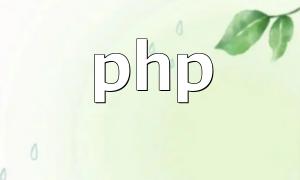PHP is a widely used server-side scripting language for web development. In PHP7, many low-level improvements were made to enhance performance and stability. This article will briefly introduce some of PHP7's low-level development principles, including the design ideas behind kernel data structures and algorithm optimizations, with code examples to demonstrate their implementation.
In PHP7, many low-level data structures were optimized, with the most notable being the hash table (Hash Table). The hash table is an essential data structure in PHP used to implement associative arrays. PHP7 optimized the storage and lookup methods of the hash table, reducing collisions and thus improving performance.
Here is a simple code example that shows how to use a hash table to store and access associative array data:
<?php
// Create an empty associative array
$person = [];
// Add data
$person['name'] = 'John';
$person['age'] = 25;
$person['city'] = 'New York';
// Access data
echo $person['name']; // Outputs: John
echo $person['age']; // Outputs: 25
echo $person['city']; // Outputs: New York
?>PHP7 also applied many algorithmic improvements to optimize performance and reduce resource consumption. One significant optimization is the Zval reference counting algorithm.
In PHP, variables are stored using the Zval structure. Prior to PHP7, each variable would be copied multiple times during operations, resulting in performance issues. In PHP7, the introduction of reference counting reduced the need for repeated copies of variables, significantly improving performance.
Here is an example that demonstrates how Zval reference counting works in PHP7:
<?php
// Define two variables
$a = 10;
$b = 20;
// Assign the value of $b to $a
$a = $b;
// Modify the value of $b
$b = 30;
// Output the values of $a and $b
echo $a; // Outputs: 20
echo $b; // Outputs: 30
?>In this example, the initial value of variable $a is 10, and the value of $b is 20. By assigning the value of $b to $a, the values are shared. When the value of $b is modified, $a also changes accordingly.
With these algorithmic optimizations, PHP7 can handle variable assignments and modifications more efficiently, improving overall performance.
This article introduced some core principles of PHP7 low-level development, especially focusing on improvements in kernel data structures and algorithm optimization. The optimization of hash tables and the introduction of Zval reference counting significantly enhanced PHP7's execution efficiency. For developers, understanding these low-level principles helps improve code performance and streamline development processes.










